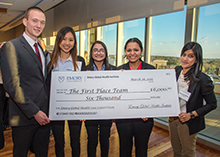While Emory did not field a basketball team in the NCAA tournament, it held its own version of March Madness when it hosted 24 multidisciplinary teams from universities around the world to participate in the Emory Global Health Institute's 4th annual International Emory Global Health Case Competition. Teams hailed from every region in the United States, with two teams coming from as far as Australia and Denmark.
Teams had a week to develop strategies for reducing gun violence in Honduras and presented their proposals to a panel judges on March 28 at the Rollins School of Public Health. The University of California (UC), Berkeley, won the competition in its first year competing. The team's solution was called "Breaking the Cycle of Violence" and involved a three-pronged approach that included the promotion of public safety, job production and economic development, and community building.
"We were all very surprised to see the case subject, especially when we compared it to all the previous cases that we had been practicing with in order to prepare. While we found the case to be pretty challenging, taking a very segmented approach to it definitely helped," says Richa Gujarati, a student at UC Berkeley's Haas School of Business.

The winning team from the University of California – Berkeley included Chris Andersen, Jee Yun Kim, Rosheen Birdie, Richa Gujarati and Asha Choudhury.
"We were able to digest a lot of the information presented in the case because we were able to segregate it out into pieces but then also establish a connection between them and how together they contribute to the violence issue in Honduras," Gujarati adds.
Second place and the Participants' Choice Award went to the University of Kentucky, which also participated for the first time this year. The University of Miami won third place, Northwestern University won Honorable Mention, and Boston University won the competition's Innovation Award.
The Emory Global Health Institute received applications from 38 universities to participate in the 24-team competition. Because of the large number of universities that were put on a waiting list, EGHI offered those schools the opportunity to participate in a video competition.
Video competition participants received the same case as on-campus participants, and a separate panel of judges evaluated their presentations. The University of Minnesota won this component of the competition.
The International Emory Global Health Case Competition's growing popularity is driven in part by its multidisciplinary approach to solving global health challenges.
"One of the most rewarding aspects of the competition was learning how to work as a multidisciplinary team. It was amazing to progress from each one of us having different ideas to formulating one cohesive solution," says Jee Yun Kim, a student at UC Berkeley's College of Letters & Science.
Visit the Emory Global Health Institute for more information about its global health case competitions and its other programs.

